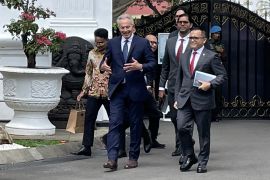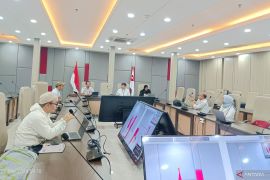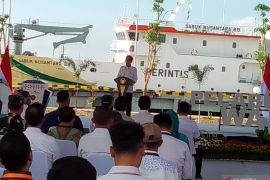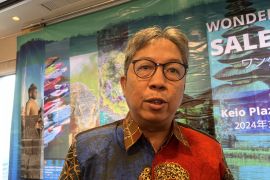The total amount of Hajj fund being managed currently reaches Rp99.34 trillion. The government is planning to invest the fund in the more profitable infrastructure sector.Jakarta (ANTARA News) - The Religious Affairs Ministry has, so far, managed funds deposited or invested in sukuk by would-be Hajj pilgrims, and the profit obtained from them has enabled the government to offer subsidies to pilgrims.
According to the Ministry of Religious Affairs, a Hajj pilgrimage trip currently costs Rp68 million for each pilgrim, but using the profits obtained from managing the Hajj fund, the government provides a 50 percent subsidy, so that a prospective Hajj pilgrim is only required to pay Rp34 million as pilgrimage cost.
The total amount of Hajj fund being managed currently reaches Rp99.34 trillion. The government is planning to invest the fund in the more profitable infrastructure sector.
Coordinating Minister for Economy Darmin Nasution stated that the profit is higher if the Hajj pilgrimage fund is invested in infrastructure projects rather than in other sectors. The interest could be as high as 12-13 percent if the Hajj pilgrimage fund is invested in infrastructure projects, Nasution noted after attending an economic meeting in Jakarta on Tuesday (Aug 1).
"Hajj pilgrimage fund is a long-term fund. If it was invested as a deposit in a bank, the interest is only around five-six percent a year. The profit would be much higher if it were to be invested in infrastructure projects," he added.
Hence, the government has put forth the idea of investing the Hajj pilgrimage fund in infrastructure projects. Last Saturday, (July 29), Religious Affairs Minister Lukman Hakim Saifuddin had suggested that funds from the Hajj Management Body could be used for productive projects.
This includes building infrastructure, and this is based on the Constitution and rules of fiqh, or Islamic jurisprudence.
"As long as the utilization of funds meets the sharia principles, which is using with caution and generating value in accordance with the prevailing regulation and for the sake of Hajj pilgrims and people, in general, Hajj funds can be diverted for investment in infrastructure," Hakim stated.
The same view was also echoed by President Joko Widodo while inaugurating the board of managers for a new independent Hajj fund agency last Wednesday (Aug 1). The head of state informed the new board, which takes over the management of the hajj fund from the religious affairs ministry, that rather than leaving funds "idle," it would be better to invest them in places that are "safe but with big profits."
Traditionally, most of the Hajj funds, received from Indonesian Muslims paying deposits to book a place for a pilgrimage, are placed in banks. By investing the Hajj fund in infrastructure projects, it will be more profitable.
Most importantly, the government is in dire need of funds to build infrastructure facilities in the country. It has projected investments worth Rp4,000 trillion until 2019 on infrastructure projects. Of this, the private sector is expected to invest about two-thirds, or Rp2,667 trillion, while the government will invest the remaining Rp1,333 trillion.
Executive Board Chairman of the countrys largest Muslim organization Nahdlatul Ulama Sulton Fatoni hailed the governments plan to use the Hajj fund for infrastructure development, as an investment in the strategic sector.
"The governments idea to invest the Hajj fund is positive from the economic perspective, so it would generate additional national income," Fatoni had remarked in Jakarta on Monday (July 31).
Fatoni said that optimizing the management of Hajj fund could boost the state income without disadvantaging would-be Hajj pilgrims who have paid their pilgrimage cost.
The Indonesian Ulemas Council (MUI) has underlined that the Hajj fund can be used for investment and infrastructure development as long as the usage of the fund is based on four conditions.
Secretary of MUIs Fatwa Commission Asrorun Niam stated at a discussion on the use of Hajj fund in infrastructure investment that the MUI had, since long, conducted studies and issued a fatwa on the utilization of Hajj fund.
"The issuance of the fatwa is intended to prevent conflict of political interests that would trigger pros and cons," Niam remarked.
He said the Fatwa Commission of MUI had discussed the utilization of idle Hajj fund, deposited by would-be pilgrims who are still on the waiting list, at an Islamic boarding school in Tasikmalaya, West Java, in July 2012.
The four conditions are included in the MUI fatwa that the fund could be used if firstly, the business type in which the fund is to be invested should meet the sharia business principle. Secondly, the investment is related to prudentiality or in a secure condition, the fund would not reduce. Thirdly, it is based on beneficial principles, and it benefits the pilgrims or Muslim community, and fourthly, the fund should be liquid, in the sense that it could be used in a continuous manner, as the average need for organizing the Hajj pilgrimage every year reaches Rp3.5 trillion.(*)
Reporter: Andi Abdussalam
Editor: Heru Purwanto
Copyright © ANTARA 2017











